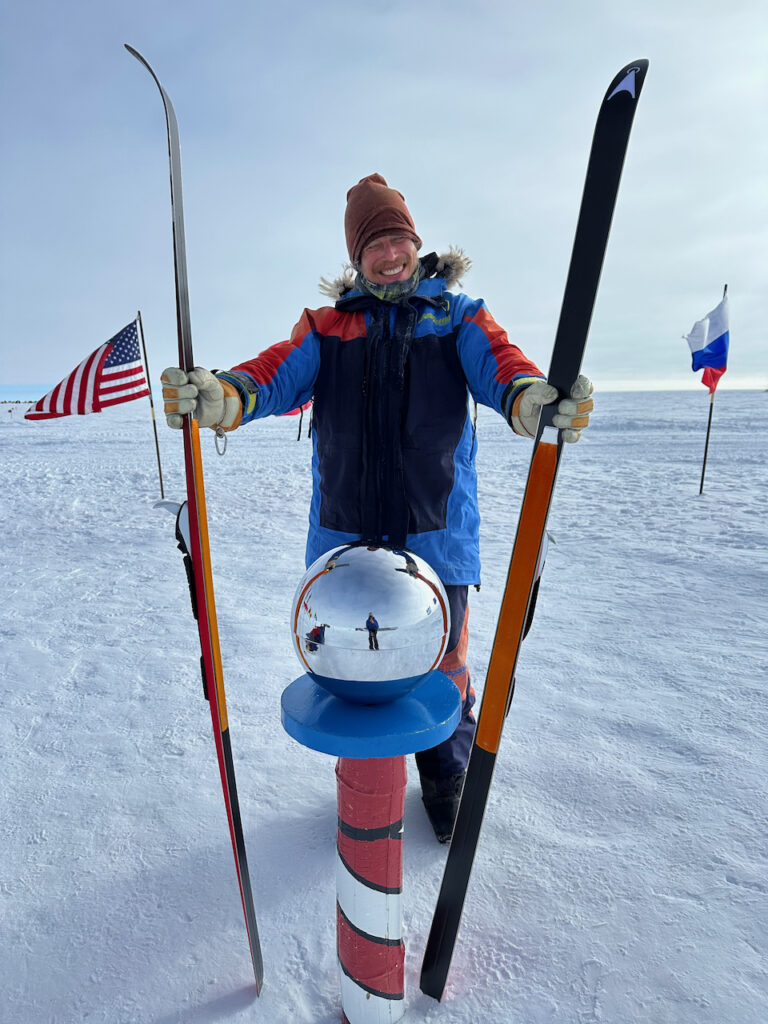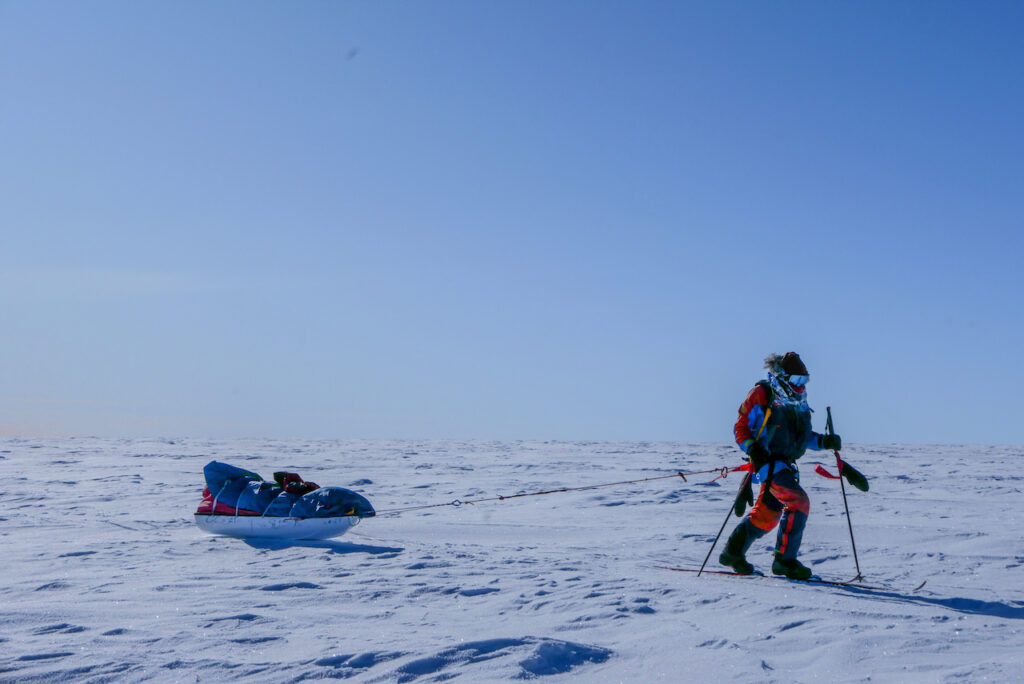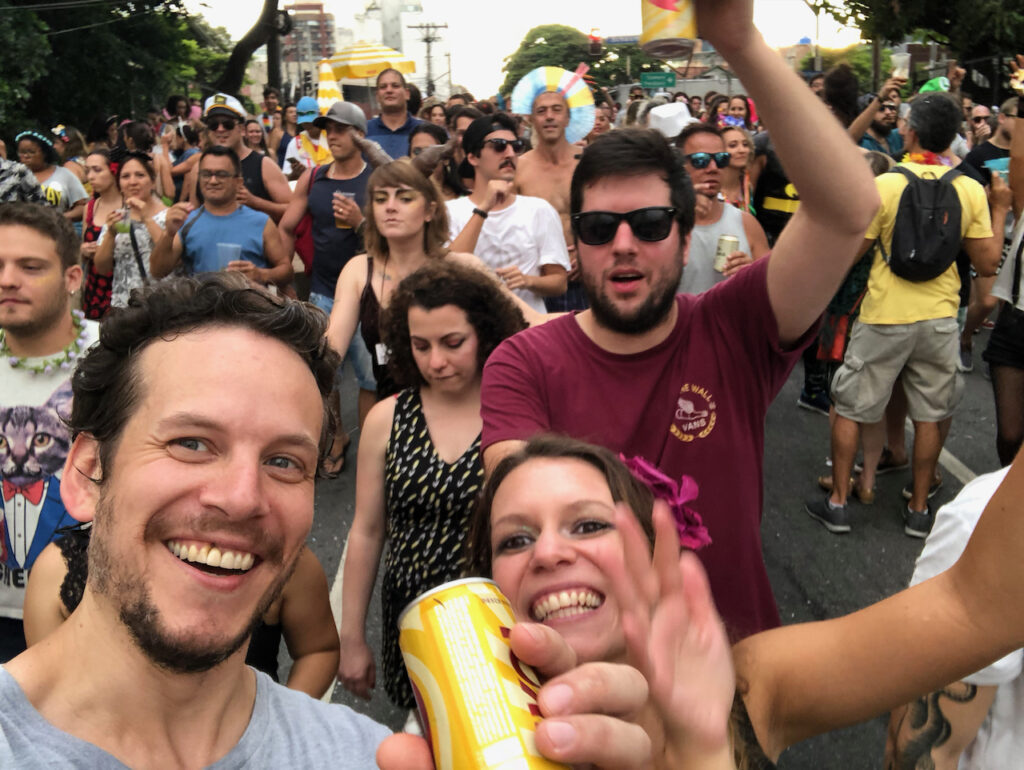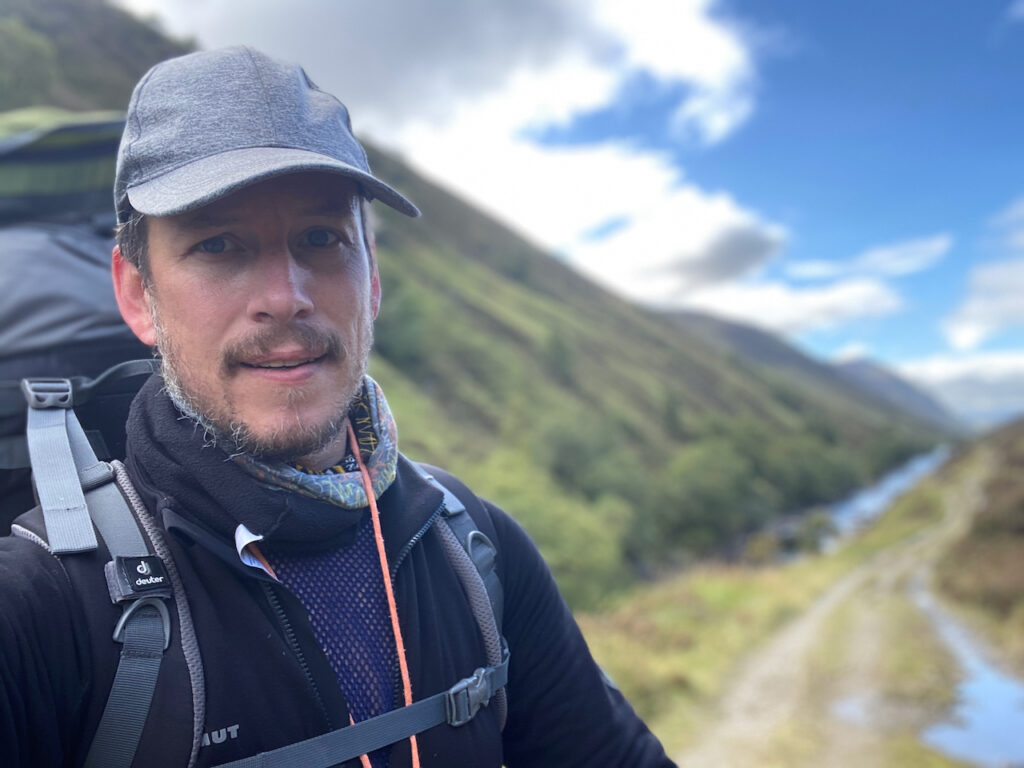Journey to the ends of the earth – and back to St Andrews
Ben Weber, MA 2004, describes how he has come full circle from graduating in 2004 to starting a PhD here in 2023 – via China, Brazil, India and an expedition to the South Pole!
The Pole
On 13 January 2023, I managed to reach the South Pole. It was an exhausting journey, both physically and mentally. I skied alone across 700 miles of ice, pulling all my supplies in a sled that started off weighing 135kg, in one of the most hostile environments in the world. Winds frequently got up to gale force; temperatures on the Antarctic plateau reached down to -30C, with a windchill of -40C or worse, and even the rest days were – if I had to choose a word – intense.
There were always new challenges, including ever-changing conditions with the snow and wind; the gradient, temperatures and visibility, and having to put the distance in due to finite supplies.
Putting the tent up alone in strong winds was always a tricky task; my nightmare vision was losing control and seeing it blow off into the empty distance. Trying to sleep when there were 24 hours of sunlight was also difficult; the eye mask was never really that comfortable.
I also had to contend with sastrugi – strange ice formations often towering up to a metre and a half in height, carved out of the snow by the wind in vast fields spreading over hundreds of kilometres. During whiteouts you can’t tell the difference between the snow and the sky and you almost feel like you are floating in a void. In those conditions, you can’t see the sastrugi until you are on top of them and about to fall off, and on one particularly bad day, I had to stop after just two hours’ skiing after falling around six times.
Then there was the endless climbing – going up from sea-level to 900m in the first day, when the sled was at its heaviest, then steadily working my way up to reach the plateau at around 2,800m—which felt more like 4,500m due to the extreme latitude. The last 100 miles before the Pole were particularly tough, despite being relatively flat, because of the colder conditions and the altitude.
I took 57 days and 10 hours to get to the Pole, and for 54 of those days, I was skiing with a neck injury that I couldn’t shake, which made progress much harder. I had to ski 40 miles in the final two days (with the injury becoming increasingly debilitating) or I would have missed the plane out of the continent and been stuck there for seven more days until the next scheduled flight. Not a great connection to miss! By the time I got to the Pole, I was physically broken and exhausted, but absolutely elated, as this was something I had dreamed of doing since I was little. And while I graduated from St Andrews back in 2004, I am indebted to my time at the University for setting me on the path to the Pole with all the experiences I have had during that journey.
Time at St Andrews and building a career
It seems like I graduated only yesterday, despite the many things that have happened since then. I initially intended to study single honours Modern History, though I ended up switching to International Relations. I really do love the modular system of the first two years as this allowed me the flexibility to sample other subjects and gain other perspectives that I wouldn’t otherwise have had. Without this, I am sure my life would have been very different. While Modern History was (and is!) extremely interesting, I just found that the different topics covered in IR were more stimulating and better suited to me. While I was studying the paramilitary groups in Colombia for my dissertation with the late Professor Wilkinson, I became so inspired that I ended up going to the country to interview officials as part of my research. It was immensely challenging but interesting and fun.
A couple of months before graduating, like many in the final year, I was pretty clueless about what I actually wanted to do in life. I had made an initial application to the intelligence services but was turned down without even getting an interview, so I went into the careers office and spoke with an adviser about possible ways forward. As luck would have it, a delegation from a college in China came in and the adviser suggested I talk to them. A few months later, I was on a flight to the country where I would stay for a year, teaching English as a foreign language.
After returning home I reapplied to the intelligence services. Unfortunately, one of the interviews didn’t go very well, so that really was the end of that dream. Professor Wilkinson helped me again by suggesting that I apply to a private business intelligence consultancy, which I had not really thought of because I had been so set on my initial plans. It worked out.
I started working for an international consultancy in London which had offices in Brazil, where I had spent my gap year. I managed to pester my bosses into transferring me over there and lived in Sao Paulo for 12 years. I built a career at the company before I then transferred to India.
After almost 15 years in the company, however, I felt like I was getting too comfortable. While I could never complain about my lifestyle, there was no challenge anymore. This was especially hard for me since St Andrews had really helped me appreciate how important it is to challenge yourself. In 2019 I therefore decided to leave my job and come back to the UK to work as a freelance consultant with my own business. This opened up a whole new world, new challenges and new opportunities, including the possibility of an expedition to the South Pole – something that would have been hard to do as a full-time employee. I spent 18 months before going to the Antarctic either working in front of a computer, training in the mountains or pulling tyres!
Going forward
St Andrews provided me with a fantastic environment in which I could not only study but also become my own person. It gave me wonderful opportunities both during and after my studies and allowed me to challenge myself. It also helped me to realise that even when things don’t go according to plan and dreams don’t always come true, more chances will always come up and we can also work hard to create our own opportunities. It is just up to us to take them.
After getting back from the Pole, it all felt a bit strange because I had fulfilled such a massive and longstanding ambition. It was also strange being with people again after so long in complete isolation!
Now it’s wonderful to be back at the University to pursue a new dream and fulfil another ambition – this time by researching the impact of business on crime and corruption in Brazil for my PhD. I know it will be an incredibly interesting and challenging few years ahead, and I am excited to think about the future and what it has in store.



